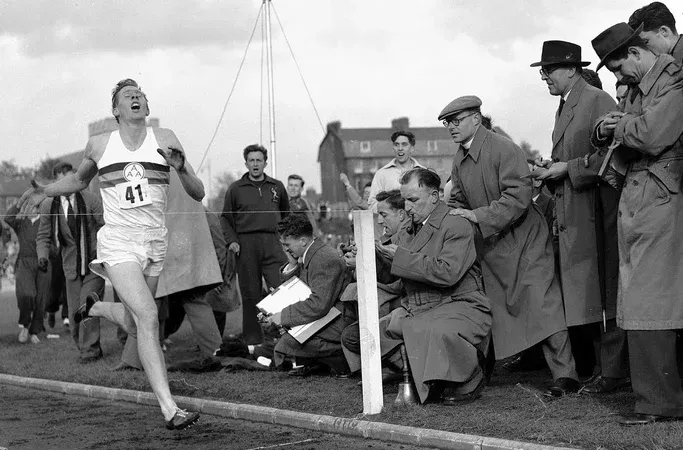LATEST BLOG POSTS

Shattering Limiting Beliefs. What's Your 4-Minute Mile?
In the annals of sports history, there are certain moments that transcend mere athletic achievements and become symbols of human potential and the power of the mind. One such moment is Roger Bannister's historic breaking of the 4-minute mile barrier on May 6, 1954. His remarkable feat not only rewrote the record books but also shattered deeply ingrained limiting beliefs about human physical capabilities. This blog explores the psychology behind Bannister's groundbreaking achievement and examines how his success paved the way for others to follow suit.
The Psychological Barrier
For decades, the 4-minute mile was considered an insurmountable barrier. Many believed that the human body simply couldn't withstand the physical demands of running a mile in under four minutes. This limiting belief had psychological consequences that hindered the progress of athletes worldwide. It created a mental blockade, preventing them from pushing themselves beyond their perceived limitations.
Roger Bannister: The Pioneer
Roger Bannister, a young British medical student and middle-distance runner, dared to challenge this belief. His ambition was fueled not only by physical training but also by his strong belief in the power of the human mind. He recognized that breaking the 4-minute mile would require not just physical endurance but also mental resilience.On that historic day in 1954, on the track at Oxford's Iffley Road Stadium, Bannister ran with unwavering determination. Despite challenging weather conditions and his competitors' doubts, he crossed the finish line in 3 minutes and 59.4 seconds, etching his name in history and proving that the impossible could be achieved with the right mindset.
The Ripple Effect: Unleashing Human Potential
Bannister's achievement had an immediate and profound impact on the world of athletics. The psychological barrier that had constrained athletes' ambitions for years was now shattered, opening the floodgates of human potential. Suddenly, the 4-minute mile seemed attainable, and other athletes felt inspired to push their boundaries and challenge their own limiting beliefs.
The "Bannister Effect"
Within a year of Roger Bannister's breakthrough, the "Bannister Effect" took hold, and multiple athletes around the world accomplished what was once deemed impossible. Notably, Australian runner John Landy broke the 4-minute mile barrier in 1954, and the following year, three more athletes achieved the feat: Laszlo Tabori (Hungary), Brian Hewson (Great Britain), and Fred Dwyer (USA).
Subsequent Mile Breakers
As the years progressed, the number of athletes breaking the 4-minute mile barrier grew exponentially. By the end of 1957, 16 athletes had achieved this incredible feat. In the United States alone, the number of sub-4-minute milers increased from just one (Glenn Cunningham in 1938) before Bannister's breakthrough to 28 by 1958. The once-elusive milestone was becoming increasingly common, demonstrating the profound impact of Bannister's accomplishment on the athletic world's collective psyche.
The Psychology of Limiting Beliefs
Roger Bannister's accomplishment serves as a powerful case study in the psychology of limiting beliefs. Limiting beliefs are deeply ingrained thoughts or perceptions that constrain individuals from realizing their full potential. They are often self-imposed barriers that can hold people back from pursuing their goals and aspirations.
Breaking these limiting beliefs is not solely about physical capability but rather about transcending mental barriers. When an individual believes they can achieve something, their actions align with that belief, leading to increased effort, perseverance, and focus. Bannister's triumph demonstrated the importance of challenging these beliefs and replacing them with empowering thoughts.
The Legacy
Roger Bannister's legacy extends far beyond his remarkable athletic achievement. He left behind a blueprint for future generations to follow – a testament to the indomitable human spirit and the power of the mind. His story continues to inspire individuals in all walks of life to question their own limiting beliefs and strive for greatness.
Roger Bannister's breaking of the 4-minute mile was a turning point in the world of sports and psychology. It showed the world that with belief, determination, and relentless effort, one could overcome seemingly insurmountable challenges. Bannister's triumph unleashed a wave of potential, empowering athletes to rise above their limiting beliefs and push the boundaries of human achievement.
This extraordinary achievement reminds us that often, our greatest limitations are the ones we impose upon ourselves. By challenging these beliefs and embracing the power of the mind, we can unlock our true potential and achieve greatness in all areas of life. Just as Bannister's legacy endures, so too does his message of breaking free from limiting beliefs and embracing the boundless possibilities that lie ahead.

